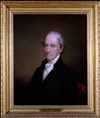KAY, THOMAS, merchant; b. 1810 in England; d. 17 Nov. 1863 at Montreal.
Like almost all of Thomas Kay’s early life, the time of his move from his native England to Montreal is unknown. By 1842, at age 32, he had established himself and his English-born wife Mary Lucy with their two small children in their own home in Montreal, and had become moderately visible in the city’s mercantile scene.
Among the great merchants of the booming Montreal of the early 1840s Thomas Kay was considered a lesser businessman, though one with considerable promise. He was already the principal owner of a prosperous general merchandising firm. His influence in the venture grew steadily as he found more and more capital for expansion, and from 1844 on he ran it under the name of Thomas Kay and Company. Acting as an importer from Glasgow, Liverpool, and London, he regularly supplied Montrealers with such goods as shoes, cottons, hardware, and wines. He tied up much of his money in the farm produce trade, buying large quantities of flour, pork, and beef from Canada West for sale to local consumers and for export to the industrial centres of the United Kingdom.
For his sizable profits in the overseas trade in bread-stuffs Kay had come to rely in part upon the preference provided by the British Corn Laws. He consequently viewed uneasily the new order triggered by the repeal of these laws in 1846. Yet he tried to adjust to it, and in March 1846 joined other Montreal businessmen such as John Young* and Luther Hamilton Holton* in founding the Free Trade Association of Montreal. A member of the association’s council, Kay felt that he had a great deal to gain by urging the relaxation of restraints upon the Canadian economy and the opening of the St Lawrence waterway to American vessels. Within a year or so, however, the beginning of hard times turned his attention away from the principles of free trade and competition. The world-wide depression of 1847–49 badly affected his business activities. It did not ruin him, but the threat seemed real enough to justify his decision to seek, together with hundreds of other disheartened commercial men in the city, a way out through the annexation of Canada to the United States. He indicated his support of annexationism in October 1849 by signing the manifesto of the Montreal Annexation Association. With its swift collapse a few months later, he pushed annexationist thoughts out of his mind and found new hope for his business operations in the good times that returned to Montreal as the 1850s began.
Continuing to meet with success in his commercial affairs, Kay also had an ongoing interest in financial, economic, and social endeavour. In 1841 he had helped to organize the Montreal Provident and Savings Bank. Throughout the 1840s and early 1850s he was a director of the Montreal Fire, Life and Inland Navigation Assurance Company. A founder of the Montreal Board of Trade in 1842, he was a member of its council in 1846 and 1855–57, and as its president in 1859 he worked with characteristic diligence to encourage the city’s economic growth. In September 1863 he contributed $2,000 to the building of the Montreal Protestant House of Industry and Refuge.
During the closing years of his life Kay lived in a large two-storey, stone house on Dorchester St. A Wesleyan Methodist, he was buried in Mount Royal Cemetery. The leading pall-bearers at his funeral were John Young and James Ferrier*, two prominent Montreal citizens who were undoubtedly impressed with his solid, if unspectacular, accomplishment in business and his active interest in the development of the city.
Montreal Board of Trade Archives, Minutes of the general meeting, 1842–63, pp.21–22, 188, 204, 216, 265–83. PAC, RG 31, 1842 census, Montreal, Queen’s Ward; 1861 census, Montreal, St Antoine Ward. Elgin-Grey papers (Doughty), IV, 1487–94. Montreal Gazette, 1835–63. Montreal Herald, November 1863. Canada directory, 1851. Montreal directory, 1844–46. The centenary of the Montreal Board of Trade (n.p., n.d.).
© 1976–2024 University of Toronto/Université Laval
Cite This Article
H. C. Klassen, “KAY, THOMAS,” in Dictionary of Canadian Biography, vol. 9, University of Toronto/Université Laval, 2003–, accessed April 19, 2024, http://www.biographi.ca/en/bio/kay_thomas_9E.html.
The citation above shows the format for footnotes and endnotes according to the Chicago manual of style (16th edition). Information to be used in other citation formats:
| Permalink: | http://www.biographi.ca/en/bio/kay_thomas_9E.html |
| Author of Article: | H. C. Klassen |
| Title of Article: | KAY, THOMAS |
| Publication Name: | Dictionary of Canadian Biography, vol. 9 |
| Publisher: | University of Toronto/Université Laval |
| Year of publication: | 1976 |
| Year of revision: | 1976 |
| Access Date: | April 19, 2024 |








